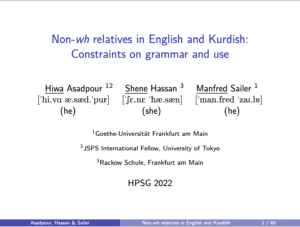 Hiwa Asadpour, Shene Hassan & Manfred Sailer sketch an analysis of English and Sōrānī Kurdish non-wh relatives in their talk at HPSG 2022 (July 29-31, 2022) on “Non-wh relatives in English and Kurdish: Constraints on grammar and use.” In both languages, there is variation between bare relatives and relatives introduced by a function word, that and ka respectively. The authors discuss some aspects of social meaning that is attached to the choice between the bare and the non-bare variant. Building on previous work on social meaning in HPSG, Hiwa, Shene & Manfred model the socially conditioned variation as a combination of conventional implicatures and particularized conversational implicatures. The paper combines results of Shene’s dissertation on English and Kurdish relative clauses, Hiwa’s fieldwork on Kurdish varieties, and Manfred’s work on non-at-issue meaning in HPSG.
Hiwa Asadpour, Shene Hassan & Manfred Sailer sketch an analysis of English and Sōrānī Kurdish non-wh relatives in their talk at HPSG 2022 (July 29-31, 2022) on “Non-wh relatives in English and Kurdish: Constraints on grammar and use.” In both languages, there is variation between bare relatives and relatives introduced by a function word, that and ka respectively. The authors discuss some aspects of social meaning that is attached to the choice between the bare and the non-bare variant. Building on previous work on social meaning in HPSG, Hiwa, Shene & Manfred model the socially conditioned variation as a combination of conventional implicatures and particularized conversational implicatures. The paper combines results of Shene’s dissertation on English and Kurdish relative clauses, Hiwa’s fieldwork on Kurdish varieties, and Manfred’s work on non-at-issue meaning in HPSG.
An important extra-grammatical factor determining the choice of bare vs. non-bare relatives in both Sōrānī Kurdish and English seems to be whether the relative clause appears in a more formal or a more informal setting and how salient prescriptive norms are to the speakers when producing or assessing a relative clause. In this sense, there is an asymmetric contact of different norms of the grammar. The paper is a result of the research initiative on the Dynamics of Asymmetric Language Contact.
Links:
- Abstract: https://hpsg2022.github.io/abstracts/Asadpour-Hassan-Sailer.pdf
- Video: https://youtu.be/ruxSQNTEHCI (25′)
- Slides: http://blog.studiumdigitale.uni-frankfurt.de/dalc/files/2022/07/AsadpourEtal-HPSG22-Slides.pdf
- HPSG 2022 conference: https://hpsg2022.github.io/
- Shene’s dissertation: Hassan, Shene. 2021. Syntactic and semantic aspects of supplementary relative clauses in English and Sōrānī Kurdish. Goethe University, Frankfurt a.M. URL: https://publikationen.ub.uni-frankfurt.de/frontdoor/index/index/docId/61371
- Blog: The Dynamics of Asymmetric Language Contact
